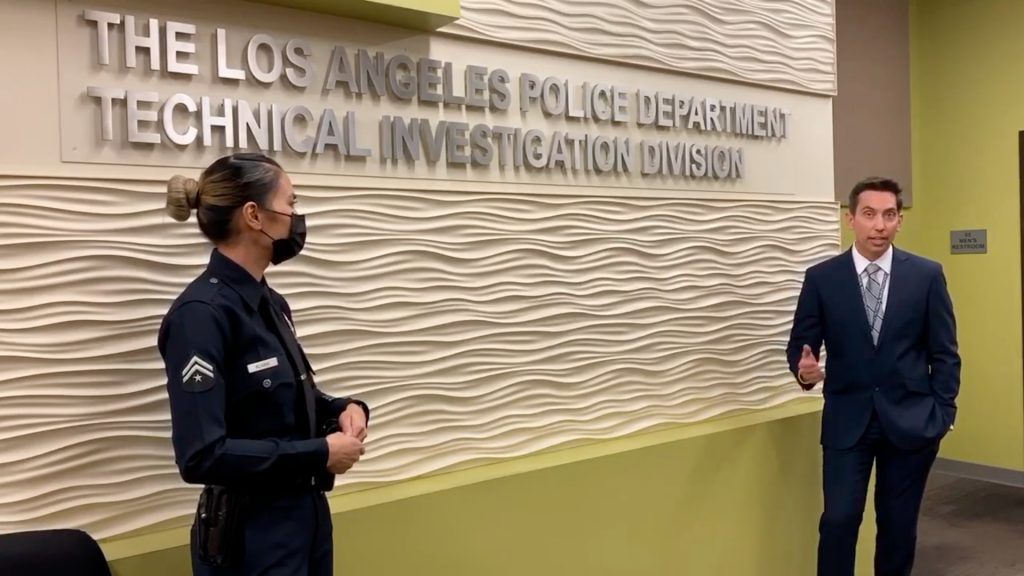
In a public relations video posted to Facebook on 24 April 2020, LAPD polygraph operator Michael Ward explains for applicants the special procedures in place for polygraph screening during the COVID-19 pandemic.
Most of the video is straightforward and non-controversial. However, in two segments, Ward makes false and misleading claims about polygraphy that call for comment.
In his scripted interview with LAPD recruiting officer Roseann Adams, Ward denies that nervousness in any way affects polygraph results:
Roseann Adams: So, I know a lot of candidates are nervous to take the polygraph exam. Does being nervous affect the result in any way?
Mike Ward: Aah, great question. Probably the top question that we get asked in the polygraph unit. The answer is absolutely not. My best advice to you is don’t be nervous about being nervous. Expect it. Being nervous just proves you’re normal, and it has absolutely no effect at all on your ability to successfully complete the polygraph exam. So relax.
Ward’s claim that nervousness does not in any way affect polygraph results is simply not true. If the subject is more nervous when answering the relevant questions than when answering the so-called “control” questions (answers to which are secretly expected to be untrue), then the subject is likely to fail the polygraph, whether or not she answers the relevant questions truthfully.
Second, Ward denies that any polygraph countermeasures work:
Adams: There is a lot of things on the internet on how to beat the polygraph exam, like sticking a thumbtack in your shoe. Is this true, and do any of these tactics work?
Ward: Heh heh. Well, don’t try that at home, I guess. Umm, you know, we have this saying around here for police officers that take their advice from the internet: give it a rest. Listen, there’s only two ways you can fail the polygraph exam. The first one is of course, if you lie, the test will definitely detect that. It’s what it’s designed to do. Two, if you try to manipulate or regulate your physiology during the test, you will also get a negative result.
We always ask candidates not to look for tips on how to pass a polygraph, because the internet is full, of course, of bad advice that if followed will by itself cause a candidate to fail their exam, even if they were truthful.
The examiner will give every candidate very easy and clear instructions that are easy to follow. If a candidate does not follow those instructions and instead resorts to internet gimmicks or tricks to try and beat the polygraph, they will end up, quite frankly, with an unfavorable result. The best advice is, give that countermeasures stuff a rest.
This response by Ward contains multiple untruths. While sticking a thumbtack in one’s shoe is indeed inadvisable as a countermeasure, Ward’s claim that there are only two ways to fail the polygraph—lying and manipulating one’s physiology (a euphemism for using polygraph countermeasures)—is a lie. Because polygraphy has no scientific basis, it is common for honest applicants who do nothing to manipulate their physiology to fail, and pre-employment polygraph failure rates tend to be high. Shortly after the LAPD mandated pre-employment polygraph screening in 2001, then Chief Bernard C. Parks acknowledged the failure rate to be 50%.
For examples of truthful persons who failed the LAPD polygraph despite not “manipulating their physiology,” see the following personal statements:
- George W. Maschke (a volunteer technical reservist and a co-founder of this site)
- J. Daine (an LAPD officer polygraphed in connection with an assignment to a specialized unit)
- “Eyes Wide Open” (an applicant)
- “Not a Yoga Master” (an applicant)
Ward lied in stating that the polygraph will “definitely” detect if you lie. False negatives (an untruthful person passing) do occur in polygraphy. One of the most notorious examples is CIA officer Aldrich Hazen Ames, who passed the polygraph twice while committing espionage against the United States.
Ward’s claim that “if you try to manipulate or regulate your physiology during the test, you will also get a negative result” is not necessarily true. No polygraph operator has ever demonstrated any ability to detect the kinds of countermeasures outlined in AntiPolygraph.org’s free book, The Lie Behind the Lie Detector. Moreover, the available scientific literature supports the view that polygraph operators are unable to detect such countermeasures.
Contrary to Ward’s claim, the reason that the LAPD polygraph unit “always ask[s] candidates not to look for tips on how to pass a polygraph” is not because they don’t work, but precisely because they do. A second reason polygraph operators don’t want applicants to research polygraphy is that the procedure is entirely dependent on trickery. An educated subject ruins the trick.
Truthful applicants may wish to learn and use polygraph countermeasures to protect themselves against the high risk of a false positive outcome. The Lie Behind the Lie Detector is a good primer. For further reading on the LAPD polygraph unit’s policies and procedures, see our 2020 report, “LAPD Polygraph Policy Documents Disclosed” and the message board thread, “LAPD Polygraph Questions Disclosed.”
On a final note, polygraphy is not the only pseudoscience Michael Ward practices. The LAPD video introduces him as “Dr.” Michael Ward but doesn’t mention whether he is an M.D. or a Ph.D. In fact, he is neither. Dr. Michael Ward is a doctor of chiropractic, “a pseudoscientific complementary and alternative medicine.”
The LAPD recruitment video is mirrored below: